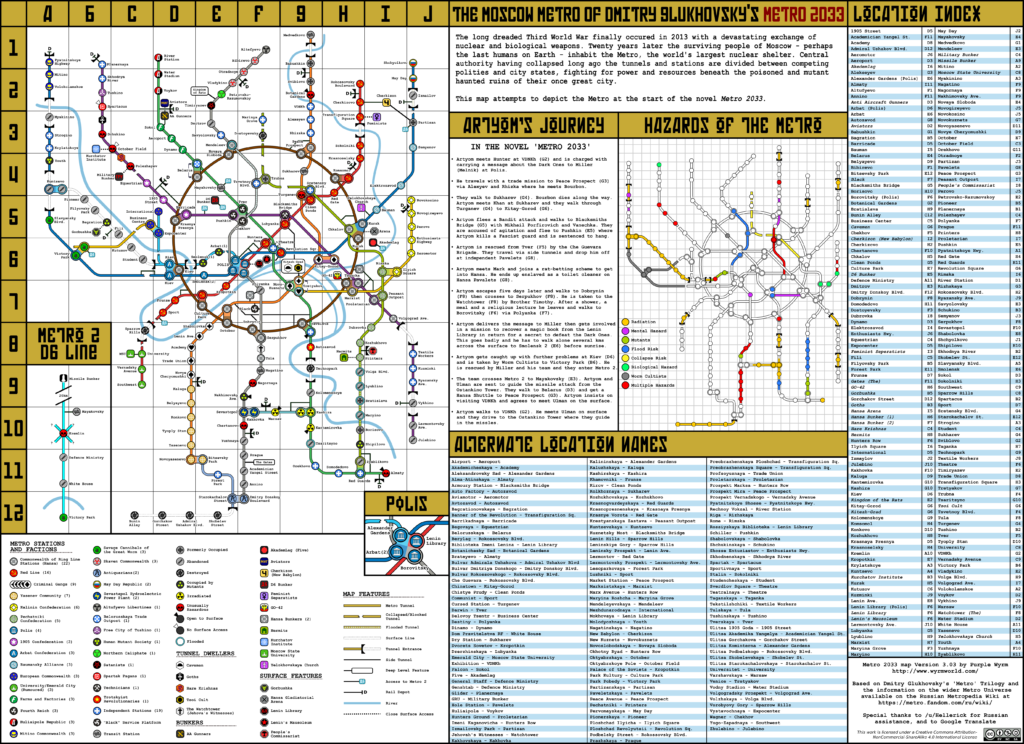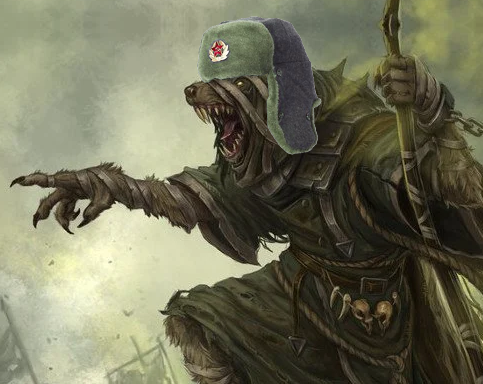As I have often commented on this blog, I am insane. Not “come at you with a tomahawk” insane, but certainly “do very strange and ill advised things” insane. Like attempting to rewrite Hamlet into rhyming couplets, or inventing the cheese shot. Well, I’ve started on another insane project – this time I’m aiming to learn more about the world created by Dmitry Glucovsky in his post-nuclear Metro 2033 series and teach myself German at the same time by re-translating the German translation of Sergey Kuznetsov’s мраморный раи into English.
Now I’m not going to do anything as crass as take a German course. That’s for sane people. No, I’m teaching myself the language by squinting at Google translate, beating myself around the head with Barron’s German-English Pocket Dictionary and occasionally sending begging emails to my friend Matt.
It’s slow progress, but it does actually seem to be working. I’m starting to recognise words and I’m sometimes able to figure out the general gist of a sentence. It’s going to be a long time before I’m singing along at Oktoberfest, but at least it’s giving me something to do and will probably have some kind of long term neurological benefit. Or something.
In any case, I thought I’d post my translation of the book’s introduction. So strap yourself in for a slightly-awkwardly-phrased journey through the harsh streets of post-nuclear Russia in Sergey Kuznetsov’s The Marble Paradise…
THE MARBLE PARADISE
by Sergey Kuznetsov
Translated from the Russian by Anja Freckman
Translated from the German by Denys the Purple Wyrm
The author dedicates this book to the shining memory of his father
Prologue
A long time ago, many years ago, there was a city here.
It was an ordinary, not particularly large provincial town. The inhabitants were simple people, some educated, some less so. They led orderly, peaceful lives, had times both good and bad, watched their children do the chores, and had a drink from time to time. They managed their lives and their city as best as they could. Some found work in the town, others commuted many hours to Moscow and back and cursed the travel time and crowded railway carriages.
Their city drowned in greenery and its squares, parks and well tended gardens were a welcoming sight. It was especially beautiful in the Indian summer when it was wreathed in every conceivable shade of yellow and red. In late autumn and in winter it was gray and monotonous, yet it still radiated its own particular warmth and coziness. On the long winter evenings the lights burnt in the homes, on the streets the lamps shone one by one in long garlands, and from the air the town looked like a giant, fully lit Christmas tree.
Now…
Now there was no longer a city. All that remained were meaningless, jumbled boxes of abandoned homes with smashed windows, torn-off doors, and power lines hanging limply between crooked, semi-collapsed power poles. Steel rods poked from the torn walls of ruined buildings like exposed bone. Across all was smeared lichen and the green-brown stain of moss. Through the cracked asphalt grass and bushes poked, and the playgrounds were overgrown with high weeds. The summer dressed rusted cars and buses in a cloak of dusty reddish green. That that could rot, decay or dissolve had – over the years – rotted, decayed and dissolved.
On this day the houses were covered by a thin layer of fresh snow, which had fallen overnight for the first time this year. It was a strange snow, light blue-gray. But not even the snow could conceal the aberrance of this world. In the dead city terrifying new residents had emerged. People had not lived here for a long time. Except…
Through the dead town staggered a man, swaying like a drunk. His dark blue radiation suit was badly torn – three deep, bloody furrows ran across the back from shoulder to waist, as if three sharpened blades had sliced in one stroke through the rubberized cloth, the fur jacket and sweater beneath and into the man’s flesh. His chest and left shoulder showed other injuries and his right arm was soaked purple with blood – although it was perhaps not his own. Only the sturdy plastic helmet on his head and the expensive foreign respirator mask strapped across his face seemed intact.
The man was breathing heavily and awkwardly dragged himself in a strange zigzag path – any observer would have thought he was wandering aimlessly. But he had one goal – to escape as soon as possible from this terrible place and reach the Military Academy. Because – he had heard – the basement levels of that facility housed a few other survivors. That would be his salvation, his only salvation. If he managed to reach it…
The man tried to concentrate, to remember: Who had attacked him? Who had he fought?
Something gigantic and grim-faced had attacked in a flash with tremendous force. The creature had pounced on him from behind, slashed him with those claws right through the suit, his clothes and – damn how his back was burning! He was losing blood and there was no way he could reach the wounds to patch them up. What if the beast had venomous claws? The second creature had knocked the gun out of his hands and would probably have demolished him with its next blow if he hadn’t had his army knife.
He’d driven the blade – a serrated-back Spetsnaz knife slightly smaller than a machete – forcefully into the monster’s gut and twisted. Both beasts seemed to lose interest and they… fled?
What happened next?
He couldn’t remember. His thoughts were confused. How had he entered the city? When? And what for?
The man couldn’t answer these questions. He remembered the battle, but tried in vain to recall the appearance of the creatures. Helpless, he gritted his teeth. Had the beasts thought he was dead? Why hadn’t they devoured him? After they’d left he must have lain unconscious for a while. He’d only come back to himself when he was already wandering through the city.
He collapsed repeatedly from exhaustion, lying on the ground, trying to get up again, but every time he staggered painfully to his feet he found that he’d lost more strength than the brief rest had granted him.
Twilight settled over the city. He looked around in alarm.
He slid his right hand in its torn glove under the protective suit to the handle of the knife, which hung in a short sheath on the belt of his jacket. He heard – or did he imagine? – sounds that made the blood in his veins falter: howls, yelps, growls, and sometimes a smack and a short angry roar, as if unknown predators were fighting for prey.
He glanced around startled, but couldn’t see anything living.
The wind came up and it started to snow again. With each step, his strength waned, but he knew that he could no longer spare the time to rest, not even for a few seconds – he had to hurry. An hour ago he could ignore the pain in his back, but now the wounds were burning like crazy. It almost felt like insects were crawling in them. He grunted and shrugged. The temperature had dropped considerably with nightfall and the cold was creeping into him through the slits in the suit.
The ruined buildings swam before his eyes, and his vision doubled as his sight dimmed. He laboriously set one foot after another, his legs were like wood and barely obeyed him. Suddenly he clearly heard a voice. Mechanically he turned towards the speaker only to find there was not a soul there.
But the twilight hissed around him, shouted, howled, and the sounds were getting closer…
He had almost left the city behind him.
It was dark.
His hand clasped the grip of the army knife.
His foot caught on a piece of broken asphalt. He tripped, and fell hard onto his back. The noises all around fell silent for a moment, and in that silence he heard, rather than felt, a sickening crunch from his left arm. When the pain arrived a few seconds later it was dull and grey.
His energy was spent. He tried rolling over onto his front like a beetle but a few attempts exhausted his last pitiful power reserves. They also knocked his knife loose and out of reach, which raised a small spark of anger in him – he would have liked to take at least one of the creatures with him into death.
As everything around him slowly sank into a fog, he realised just how carefully a large grey animal was slinking out of the nearby bushes, snuffling up his scent with its half-rat half-wolf snout, teeth bared and growling.
Then he lost consciousness.
Want to know what happens next? Learn German! 🙂




